For Diversity and Equality at the Workplace
First joint Diversity Day at GEOMAR sets a signal against racism and right-wing ideologies
“It is a great pleasure for me to open the Diversity Day. Research at GEOMAR benefits greatly from the strengths and values of our centre, especially the promotion of diversity,” said GEOMAR Director Professor Dr Katja Matthes at the opening of the 12th German Diversity Day. The action day is an initiative of the association “Charta der Vielfalt”, and took place for the first time on the newly united GEOMAR campus.
In the lecture “How do right-wing extremists position themselves towards a society that lives diversity and is diverse?” the Consultation Team against Right-Wing Extremism in Kiel provided concrete recommendations for dealing with right-wing extremist attitudes and discussed the impacts of sexist, racist, and anti-Semitic views, especially in work situations that benefit from international exchange.
“Joining forces to promote diversity and combat discrimination is more important than ever in times of anti-democratic tendencies,” said Nikole Lorenz, a member of the Gender Equality & Diversity team at GEOMAR. “The talk was very helpful in understanding the topic better and offered practical advice on how we can react in the workplace and in our private lives to counteract these attitudes.”
In a workshop entitled “Critical Whiteness”, participants could also engage with their own role in a racist society and develop concrete actions to actively combat racism. The workshop was offered by EmBIPoC from Kiel University (CAU). The acronym stands for “Empowerment for Black, Indigenous, and People of Colour”. These terms are the political self-descriptions of people who experience racism and are not perceived as white, “German” or “Western”.
In addition, a Diversity Glossary was presented during the Diversity Day and is now available to all employees in the GEOMAR library. It contains key terms related to diversity and serves as a linguistic basis for discussions. The selection was based on the needs of employees in their daily work. Glossary initiator Hjördis Lorenzen explains: “It is important to have a foundation so that everyone knows what we are talking about. Some terms may be unfamiliar, making it difficult to participate in discussions. Asking questions can be uncomfortable for many. The glossary allows everyone to look up the specific terms themselves.”
Reid Brennan, a member of the “Staff4Diversity” network, summed up: “I am glad to work in an institution that supports efforts to create a diverse and inclusive workplace for everyone. It is vital that we continue these efforts and measures, not just once a year, but every day, as promoting equality and inclusion requires consistent and continuous attention from all of us.”
Background Information
Regional Consultation Teams Against Right-Wing Extremism:
The Regional Consultation Teams Against Right-Wing Extremism are represented at four locations in Schleswig-Holstein: Lübeck, Itzehoe, Flensburg, and Kiel. The regional offices are each responsible for the surrounding districts and towns, and are additionally networked with each other. The RBTs are managed by the AWO State Association Schleswig-Holstein and the Action for Child and Youth Protection (AKJS) Schleswig-Holstein. The offices are funded by the federal programme “Living Democracy!” and the “State Programme for the Promotion of Democracy and the Fight against Right-Wing Extremism.”
Charta der Vielfalt e.V.:
“Charta der Vielfalt” is an employer initiative promoting diversity in companies and institutions. Founded in December 2006 by four companies, it is supported by the Federal Government Commissioner for Migration, Refugees, and Integration, State Minister Reem Alabali-Radovan. The initiative aims to advance the recognition, appreciation, and inclusion of diversity in the workplace in Germany. Organisations should create a work environment free from prejudice. All employees should be valued regardless of age, ethnic origin and nationality, gender and gender identity, physical and mental abilities, religion and belief, sexual orientation, and social background.
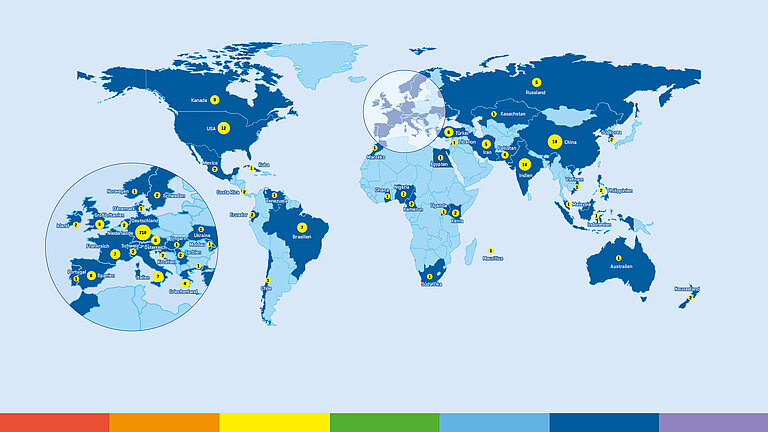
The map shows the many countries of origin of 881 GEOMAR employees. Graphic: Christoph Kersten
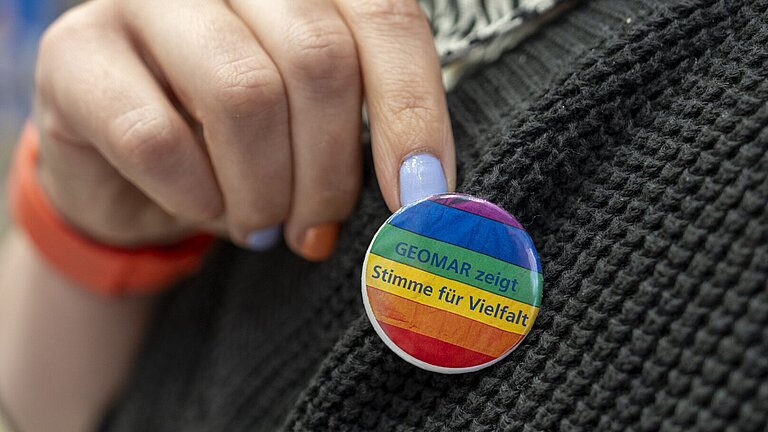
On Diversity Day, the GEOMAR staff flew the flag for diversity and against marginalisation. Photo: Sarah Uphoff
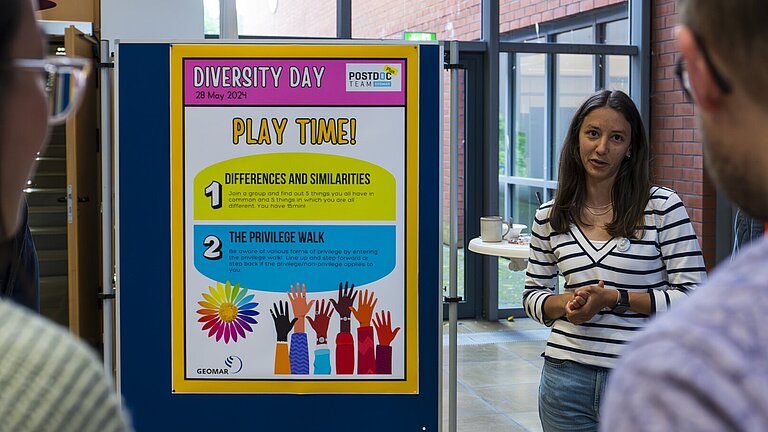
The postdoctoral team offered awareness-raising games to help players analyse their own role in society. Photo: Sarah Uphoff
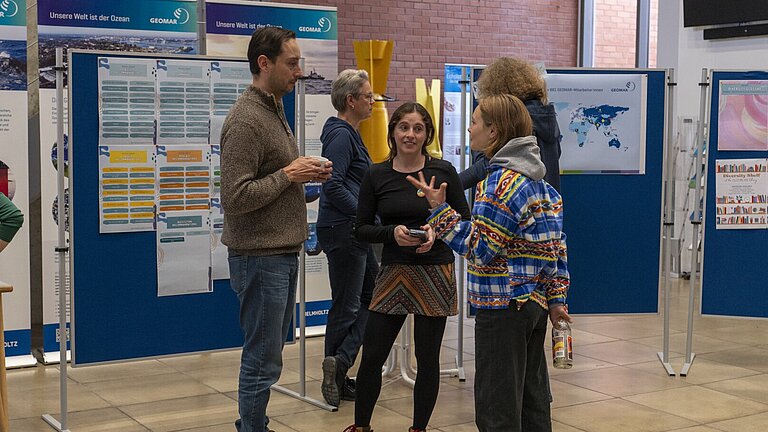
Awareness of discrimination and experiences of racism is particularly important in an international working environment: Employees engage in discussion. Photo: Sarah Uphoff
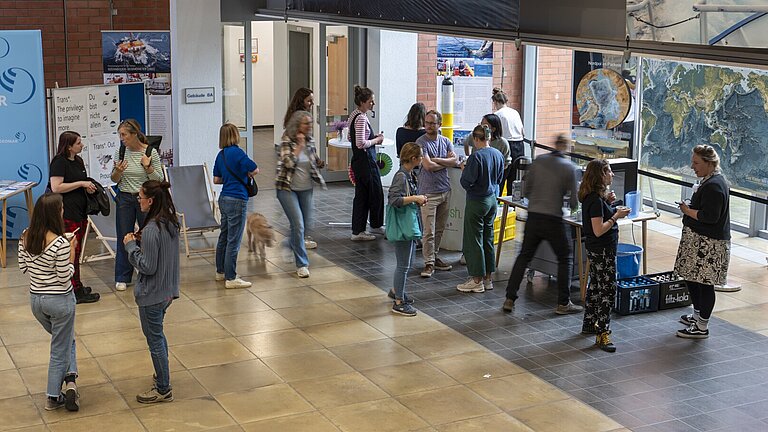
In the foyer of GEOMAR there were games and information about diversity and equality. Photo: Sarah Uphoff
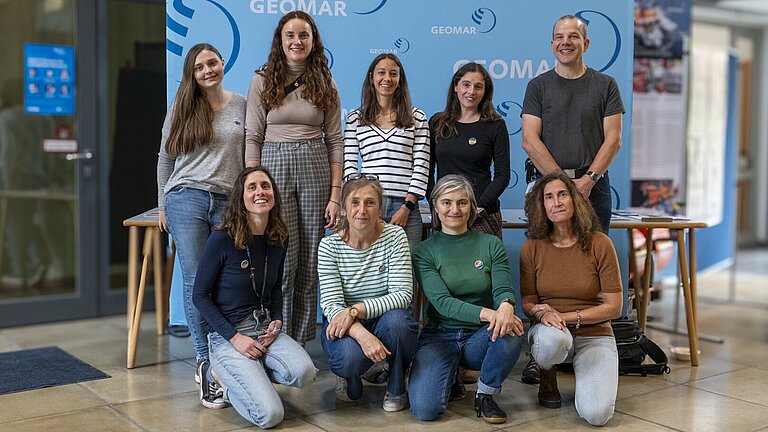
Members of the Staff4Diversity network: They were instrumental in organising the first joint Diversity Day at GEOMAR. Photo: Sarah Uphoff


